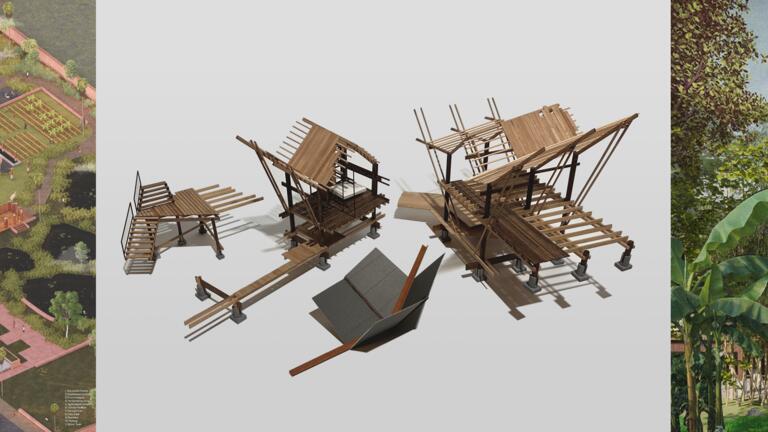ASO Studio: Compoundologies - Timber, Folklore, and the Community Irrigation Networks of Chiang Mai
This studio fosters knowledge built off of years of relationship building in Chiang Mai, Thailand using fieldwork, toys, comics, film and visual storytelling to explore citizen empowered design and the regenerative building practices of indigenous timber construction.

Common Imaginaries by Ajay Chovatia, Brian Hartman, and Yonghao Jerry Zhang
ASOS Catalog Course Description
In the face of socio-ecological justice, how do we learn from other intelligences to build knowledge in material economies, local sourcing, design detailing and the processes of architecture as community empowerment?
This studio fosters knowledge built off of years of relationship building in Chiang Mai, Thailand using fieldwork, toys, comics, film and visual storytelling to explore citizen empowered design and the regenerative building practices of indigenous timber construction. Chiang Mai is the second-largest province by land area in Thailand (20,107 square kilometers) and the fifth-largest province by population (approximately 1.7 million people). It is located in the northern part of the country, approximately 685 kilometers from Bangkok, on the Mae Ping River basin at the valley between the Mountain Ranges of Lampang and Mae Hong Son. As a design family, we situate contemporary design discourses around timber, the commons, canals and architecture into systemic socio-ecological processes that includes folklore, forests, land ritual, harvesting, building, repair and the geologic commons. Using field work in a string of villages 8 kilometers east of the center of the expanding city of Chiang Mai, we explore how the collective wisdom of community stewards uses vernacular timber methods to reimagine an architecture for and of their commons. The studio sharpens techniques in urban-rural forensics, animation, detailed prototyping and typo-morphological research. At four different scales – geology, the city, the building and the construction detail – we posit emergent narratives from the villages to establish a critical thinking position, a manifesto, and redefine the notion of the city and its architecture to engage social, political and economic realities.
With a focus on locality, this studio believes that contemporary building practices can be recalibrated with the embodied knowledge of everyday stewards, ultimately transitioning object-based approaches to address systemic issues that frame contemporary architectural practice. The semester-long journey nurtures a comprehensive project that includes animations, detailed architectural illustrations and scaled fabrications in the design of a village compound. A pilot exhibit closes the design studio, holding a larger conversation around community empowered architectural design, regenerative practices in architecture, storytelling and activism.